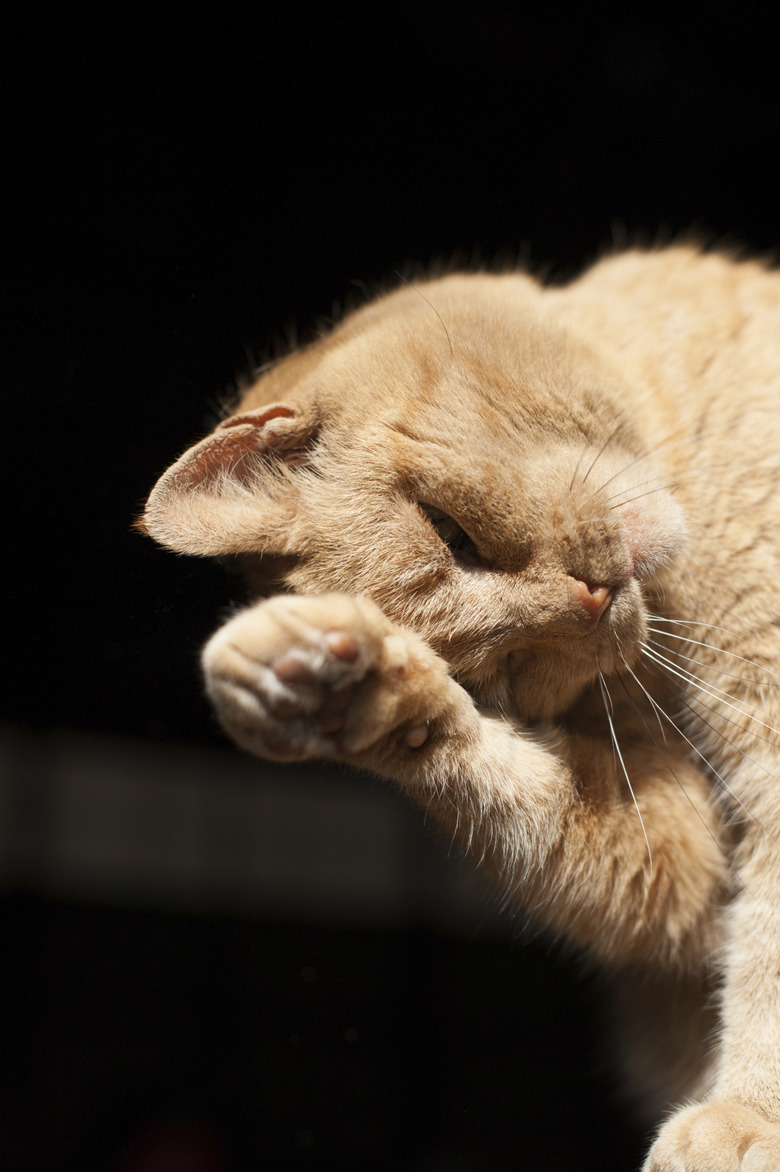Olive Oil Uses For Cats
Olive oil isn't just for humans; your feline family member can consume it, too. This oil is helpful for minimizing hairballs, protecting skin, reducing inflammation and even helping with ear infections. It is possible to give her too much of a good thing, though. Olive oil is just a concentrated source of fat and, thus, it's high in calories. Too much of it will make your kitty gain weight. Talk with your veterinarian to determine the right amount of olive oil your prancing pal should be consuming.
Hairball Relief
Hairball Relief
Most cats spend a good portion of their day grooming themselves. Petting sessions, play sessions, mealtimes and naps all require subsequent baths. All of that licking draws loose fur into your kitty's belly. Her digestive tract can expel only so much through bowel movements. Any extra that fills up her belly comes back up through her mouth in the form of hairballs. Olive oil helps lubricate the cat's intestinal tract, making a moist environment for dry clumpy fur to move right through. This oil does absorb in her intestinal tract, though, so it might not be helpful if her hairball problem is severe.
Healthy Skin
Healthy Skin
Your feline companion needs fat in her diet to keep her coat soft, shiny and pristine. Olive oil is rich in several polyunsaturated fats, such as linoleic acid, that are critical for skin health. These fatty acids keep her skin soft and supple, allowing her fur to get the essential oil it needs to thrive. Without adequate healthy fats in her diet, her skin can become dull, irritated and flaky. Because her skin can dry out, she might also be more prone to excess shedding and losing too much fur.
Inflammation Reduction
Inflammation Reduction
Inflammation can affect every part of your cat's body. Between allergic breakouts on her skin, arthritis in her joints and inflammation in her bowels that cause irregularity, she may be uncomfortable, even if it isn't obvious to you. The high amount of omega-rich fatty acids in olive oil, particularly omega-3s, plays a big role in the inflammatory response. The beneficial polyunsaturated fatty acids can minimize pain and swelling associated with chronic inflammatory conditions. Omega-rich fatty acids may also be healing for inflammatory kidney problems, although your veterinarian will have to do an exam to find the proper treatment.
Ear Mite Treatment
Ear Mite Treatment
You've noticed that your fuzzy princess' ears are wide open to the elements. Bugs and bacteria can easily sneak in, causing infection in her ear canal. Mites, for one, are known to cause infections in felines. If your little lady has ear problems, she'll bat at her ears, shake her head or cock her head to one side. You'll probably notice a foul odor coming from her ears, too. Olive oil can treat infections caused by ear mites — just a few drops in each ear daily. However, get permission from your vet first. Improperly treated infections can permanently damage her ears.
Always check with your veterinarian before changing your pet's diet, medication, or physical activity routines. This information is not a substitute for a vet's opinion.
